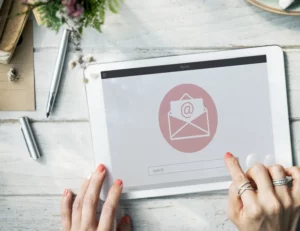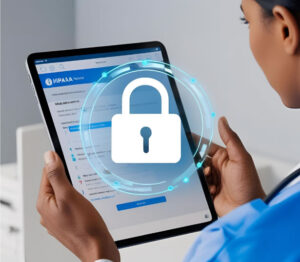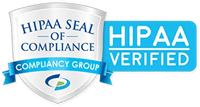In the healthcare industry, safeguarding patient information is not just an ethical responsibility—it’s a legal requirement mandated by the Health Insurance Portability and Accountability Act (HIPAA). HIPAA establishes strict standards to protect Protected Health Information (PHI), ensuring confidentiality, integrity, and security during storage and transmission. As communication increasingly relies on email, ensuring these messages meet HIPAA’s encryption requirements becomes crucial for maintaining compliance and avoiding expensive penalties.
However, healthcare providers face a significant challenge: balancing the need for efficient and convenient email communication with the imperative of protecting sensitive data. Rigid security protocols can sometimes hinder workflow, yet lax practices risk breaches and regulatory violations. The key is to adopt an HIPAA compliant email encryption service that offers both security and usability.
This article aims to guide healthcare organizations and providers in understanding HIPAA encryption requirements for secure email for healthcare. We will explore how to evaluate and select the right encryption solutions, emphasize the critical features that ensure compliance, and discuss the benefits of using a robust secure email for healthcare environment. By educating yourself on the core requirements and options available, you can confidently implement encryption that not only protects patient data but also streamlines your communication processes in line with regulatory standards.
Understanding HIPAA and Email Security Requirements
The Health Insurance Portability and Accountability Act (HIPAA), enacted in 1996, establishes national standards to preserve the privacy and security of individuals’ Protected Health Information (PHI). For healthcare providers, insurers, and business associates, HIPAA’s security rule mandates safeguards to protect electronic PHI (ePHI), including technical measures like access controls, audit controls, and encryption.
PHI encompasses any individually identifiable health information—such as medical records, lab results, billing details, and demographic data—that is stored, transmitted, or received electronically. The sensitivity of PHI makes it a prime target for cyber threats, underscoring the need for strict security measures.
For email communication, two key components of the HIPAA privacy and security rules are particularly relevant:
- Safeguards: Technical safeguards, such as email encryption for healthcare, ensure that PHI remains confidential during transmission and storage.
- Policies and Procedures: Organizations must develop and enforce policies that incorporate secure methods for handling PHI, including encryption.
Encryption plays a vital role in HIPAA compliance, as it helps organizations meet the HIPAA Security Rule’s requirements for protecting ePHI. Using encryption standards that comply with HIPAA guidelines ensures that sensitive data transmitted via email remains confidential and protected against unauthorized access, helping organizations avoid breaches and penalties.
What Is a HIPAA Compliant Email Encryption Service?
A HIPAA-compliant email encryption service is one that meets HIPAA’s standards for protecting ePHI during transmission and storage. Simply put, it encrypts email contents with approved, robust algorithms and ensures only authorized parties can unlock and read the messages.
Regular encryption—such as TLS—secures data during transit but doesn’t necessarily protect data stored on servers or ensure authenticity. In contrast, HIPAA-compliant email encryption typically includes end-to-end encryption and digital signatures, providing both confidentiality and sender verification.
Encryption plays a critical role in protecting PHI transmitted via email, preventing interception and unauthorized access. For instance, if a healthcare provider sends a patient’s lab results encrypted, even if the email is intercepted, the information remains unreadable to outsiders, ensuring compliance with HIPAA security standards.
For organizations handling sensitive health data, choosing a secure email solution that is labeled HIPAA compliant ensures adherence to federal regulations while safeguarding patient trust.
Why Healthcare Organizations Need Encrypted Email Communication
Unencrypted email communication poses substantial HIPAA violation risks. For example, sending unprotected patient data—such as diagnoses or billing info—via plain email could lead to breaches if intercepted or accessed on compromised servers. Such violations may result in hefty fines, legal penalties, and irreparable damage to a healthcare provider’s reputation.
Beyond regulatory penalties, non-compliance erodes patient trust. Patients expect healthcare providers to protect their sensitive information; failing to do so can discourage engagement and affect the organization’s credibility.
Investing in a robust HIPAA compliant email encryption service offers numerous benefits:
- It ensures secure email communication of PHI, maintaining confidentiality at all points—during drafting, transmission, and storage.
- Encryption also reduces the risk of data breaches, safeguarding your organization against costly legal actions and reputation damage.
- Most importantly, it builds patient trust, demonstrating your commitment to privacy and data security—core values that underpin healthcare.
By prioritizing encrypted email for healthcare, organizations not only comply with HIPAA but also foster a culture of trust and integrity in digital health communication.
Key Features to Look for in a HIPAA Compliant Email Encryption Service
Choosing a HIPAA compliance-focused email encryption service requires evaluating features that ensure the security of Protected Health Information (PHI) and facilitate seamless integration into healthcare workflows:
- Encryption Technology (AES, TLS, End-to-End): Ensure the provider uses AES (Advanced Encryption Standard), the industry standard for data security, for encrypting stored data. During transit, TLS safeguards emails as they move between servers. For maximum security, look for end-to-end encryption options, which encrypt messages on the sender’s device and decrypt only on the recipient’s device, preventing intermediaries from accessing the content.
- Multi-Factor Authentication (MFA) and Access Control: MFA adds a second verification layer—via SMS, authenticator apps, or biometric authentication—making unauthorized access significantly more difficult. Coupled with role-based access controls, MFA helps enforce strict HIPAA encryption features necessary for secure email for healthcare providers.
- Audit Trails and Reporting Features: Robust audit logs document every encrypted message sent, received, or accessed. This is critical for HIPAA compliance and for tracking data handling, breach attempts, or policy violations.
- Business Associate Agreement (BAA): Confirm that the vendor provides a BAA, legally binding them to HIPAA compliance and to safeguarding PHI. A BAA is fundamental for HIPAA compliant services and a key consideration when selecting secure email solutions.
- Ease of Integration with Email Clients: The encryption service should work seamlessly with platforms like Gmail, Outlook, or enterprise email systems, without creating workflow disruptions.
- User-Friendliness and Mobile Compatibility: For adoption, services must be intuitive and accessible on smartphones and tablets, enabling secure mobile healthcare communication.
- Data Backup and Secure Storage Policies: Look for providers that automatically back up encrypted data securely, ensuring availability and disaster recovery, while maintaining compliance with data retention policies.
How HIPAA Compliant Email Encryption Services Work
The HIPAA compliant email process involves several steps to ensure secure communication:
- Composing: The sender drafts an email containing PHI, opting to encrypt the message according to policy—either automatically via the encryption platform or manually.
- Sending & Encrypting: When the email is sent, the system encrypts the message. Encryption can be performed client-side, via gateway, or cloud services—depending on the solution. Certificates or keys validate sender identity.
- Encryption Keys & Certificates Management: Secure key management involves generating, storing, and renewing digital certificates. Keys are typically stored in protected hardware or encrypted vaults, with strict controls on access. During message exchange, public keys are exchanged (often via secure directories), and only the recipient’s private key decrypts the message, maintaining confidentiality.
- Receiving & Viewing: The recipient uses their private decryption key to unlock the secure message on their device. They can then read, reply, or forward, with all actions being logged and auditable for compliance purposes.
- Secure Healthcare Communication: This workflow ensures encrypted email workflow continuity, enabling healthcare providers to communicate securely for healthcare providers while respecting HIPAA encryption features and safeguarding PHI during every step.
Comparing the Top HIPAA Compliant Email Encryption Services
When selecting a HIPAA compliant email encryption service, organizations must evaluate features, ease of use, pricing, and compliance support. Here’s an overview of some leading solutions:
| Service | Key Features | Pricing (est.) | BAA Available | Ease of Use | Best For |
| Virtru | Seamless integration with Google Workspace, Microsoft 365; encrypts emails and attachments; user-friendly UI | Starts at $3/user/month | Yes | Very easy; browser plugins | Small to medium businesses |
| Hushmail | Healthcare-focused encrypted email; HIPAA-ready, HIPAA-compliant email portal | Starts at $5/user/month | Yes | Very simple; web portal | Small clinics, solo practitioners |
| Paubox | Transparent encryption; auto-encrypts emails; no recipient app required | Custom pricing; moderate | Yes | Very intuitive; no client setup | Healthcare providers needing seamless experience |
| LuxSci | Advanced security features; API integration; HIPAA-compliant encryption | Custom quotes; enterprise ready | Yes | Moderate; admin-friendly | Large enterprises, hospitals |
| NeoCertified | Fully HIPAA-certified secure platform; compliant with multiple regulations; audit-ready | Custom pricing; enterprise focus | Yes | User-friendly; mobile support | Healthcare organizations with rigorous compliance needs |
Key Takeaway:
- For small clinics or solo practitioners, Hushmail or Virtru offer straightforward setup and ease of use.
- For larger hospitals or enterprise needs, LuxSci or NeoCertified provide extensive security controls, compliance features, and scalability.
Choosing the exemplary service depends on your organizational size, compliance requirements, and budget.
How to Implement a HIPAA Compliant Email Encryption Service
Implementing an effective, HIPAA compliant email encryption system involves careful planning:
- Onboard and Configure:
- Choose a provider aligned with your organizational needs.
- Sign a Business Associate Agreement (BAA) to meet HIPAA requirements.
- Configure email settings, certificates, or encryption policies through the provider’s platform.
- Staff Training and Compliance Awareness:
- Educate staff on encryption procedures, recognizing phishing, and handling PHI securely.
- Conduct regular HIPAA compliance training sessions to reinforce best practices.
- Create Internal Policies and SOPs:
- Document procedures for encrypting emails containing PHI.
- Define protocols for key management, incident response, and breach notification.
- Test and Audit:
- Send test encrypted emails to ensure compatibility and decryptability.
- Regularly audit email security logs and review compliance adherence.
- Keep software, certificates, and encryption keys updated.
These steps ensure your organization maintains a secure email implementation that aligns with HIPAA standards, minimizes risk, and builds patient trust.
Common Mistakes to Avoid in Email Encryption and HIPAA Compliance
One of the most widespread HIPAA compliance mistakes is assuming that standard email—such as Gmail or Outlook—is automatically secure. While these providers often use TLS to encrypt emails in transit, they do not ensure end-to-end encryption or secure storage, leaving PHI vulnerable if additional safeguards aren’t implemented.
Another critical error is failing to sign a Business Associate Agreement (BAA) with your email encryption provider. Without a BAA, your organization may violate HIPAA, and you risk penalties if a breach occurs. It’s essential to choose providers that clearly offer BAAs and ensure compliance.
Poor access control or outdated encryption protocols pose serious risks. Using weak encryption standards or not managing user access securely can lead to unauthorized data exposure. Regularly review encryption methods and restrict access based on user roles and permissions.
Finally, many organizations neglect ongoing compliance monitoring. HIPAA regulations require continuous review and updates of security policies, encryption settings, and breach response plans. Failure to perform regular audits increases vulnerability and the potential for costly violations.
Avoid these pitfalls by staying informed, enforcing strict policies, and leveraging modern encryption standards—keeping PHI protected and your organization compliant.
The Future of HIPAA Compliant Email Encryption Services
Looking ahead, encryption trends in 2024 point to smarter, more adaptive security solutions. AI-driven threat detection will become integral, automating real-time analysis and automatically blocking suspicious emails or anomalous activity, enhancing overall security posture.
Automation and seamless encryption workflows will simplify compliance, making encryption transparent for users and reducing human error. Encryption will also expand to secure patient portals, enabling encrypted data exchanges that are both user-friendly and compliant with HIPAA.
A major shift will be toward zero-trust architecture, where every access point—devices, users, or applications—is verified continuously, regardless of location. This approach significantly reduces insider threats and unauthorized access, aligning with regulatory expectations for advanced secure healthcare technology.
Furthermore, we expect advanced encryption algorithms and quantum-resistant cryptography to replace current standards. As quantum computing advances, existing encryption methods may become vulnerable, prompting the industry to adopt future-proof encryption solutions that can withstand future threats.
In conclusion, the future of HIPAA compliant email lies in adaptive, AI-enhanced, and user-centric encryption strategies. Healthcare organizations must invest in scalable, intelligent solutions to ensure secure healthcare technology remains resilient against evolving cyber threats and maintains patient trust in the digital age.
Final Thoughts
Adopting an HIPAA compliant email encryption service is essential for healthcare organizations aiming to protect patient data, maintain regulatory compliance, and foster trust. Secure email for healthcare not only safeguards sensitive PHI during transmission and storage but also supports smoother workflows, reduces legal risks, and enhances patient confidence. Ensuring your organization’s encryption policies meet HIPAA encryption requirements demonstrates a proactive commitment to data privacy and security.
Investing in reliable encrypted email services and verifying BAA for HIPAA email compliance are critical steps. Regularly evaluate your current providers, update encryption protocols, and implement best practices for data handling. A strong security posture not only prevents costly breaches but also establishes your reputation as a trustworthy provider in the digital health landscape.
Take action today: review your organization’s email security measures, choose the best HIPAA compliant email provider for your needs, and actively work toward continuous encryption compliance. Protecting patient data isn’t optional—it’s a fundamental part of quality healthcare delivery in 2024 and beyond.
Frequently Asked Questions
Do Gmail or Outlook support HIPAA compliant email encryption?
ppYes, both Gmail (with Google Workspace) and Outlook (with Office 365) support encryption features like TLS and S/MIME. However, full HIPAA compliance requires proper configuration, use of encryption certificates, and implementing additional security policies.
Does HIPAA require end-to-end encryption?
HIPAA does not explicitly mandate end-to-end encryption, but it does require reasonable and appropriate safeguards, including strong encryption, to protect electronic PHI during storage and transmission.
What’s the best affordable HIPAA-compliant email option?
Solutions like ProtonMail, Tutanota, or affordable plans from Paubox and Virtru offer HIPAA-compliant email encryption at a reasonable price, with easy-to-use interfaces suitable for small practices and clinics.
How can I verify if my email provider is HIPAA compliant?
Confirm whether the provider offers a Business Associate Agreement (BAA), supports HIPAA encryption features, and has suitable security processes in place. Check their compliance documentation and industry certifications.






